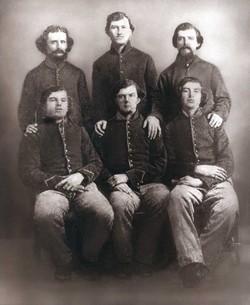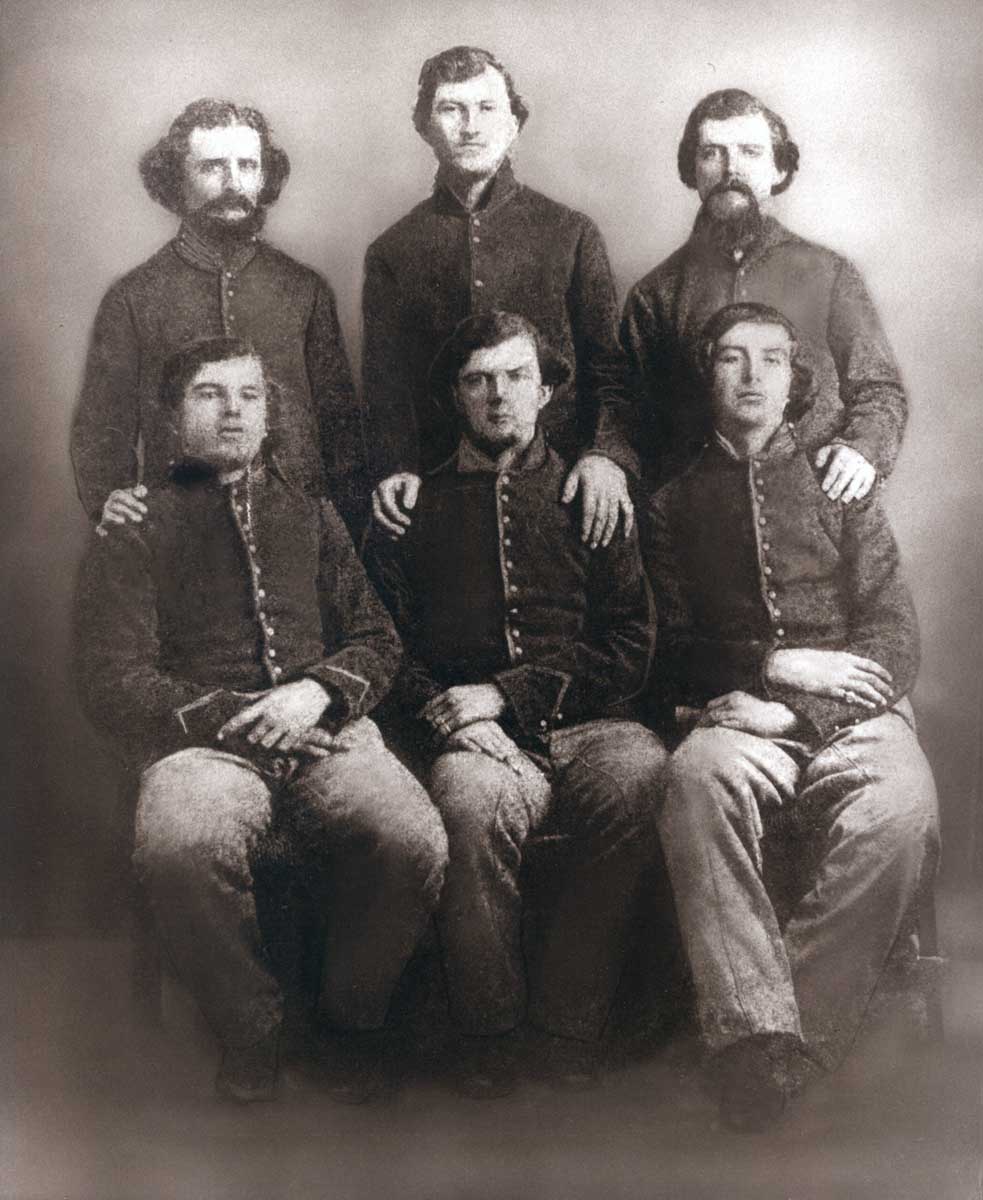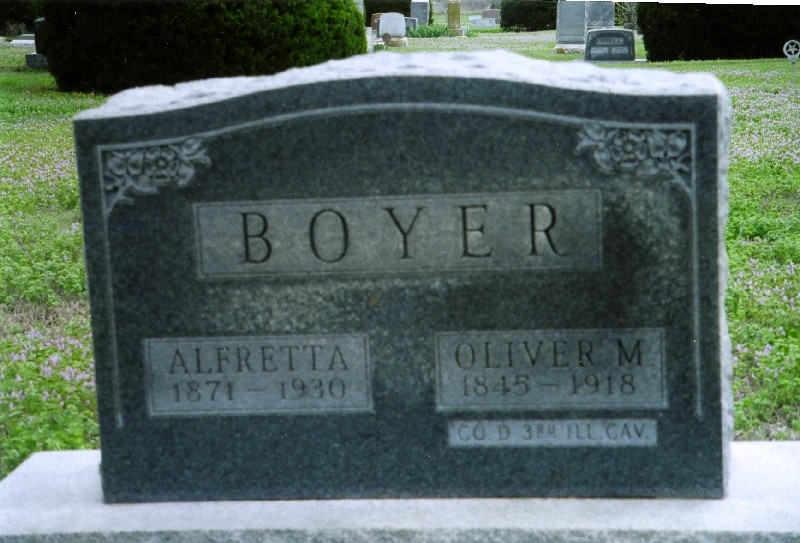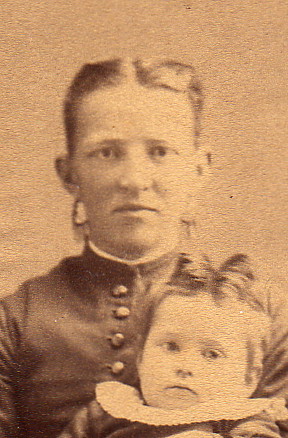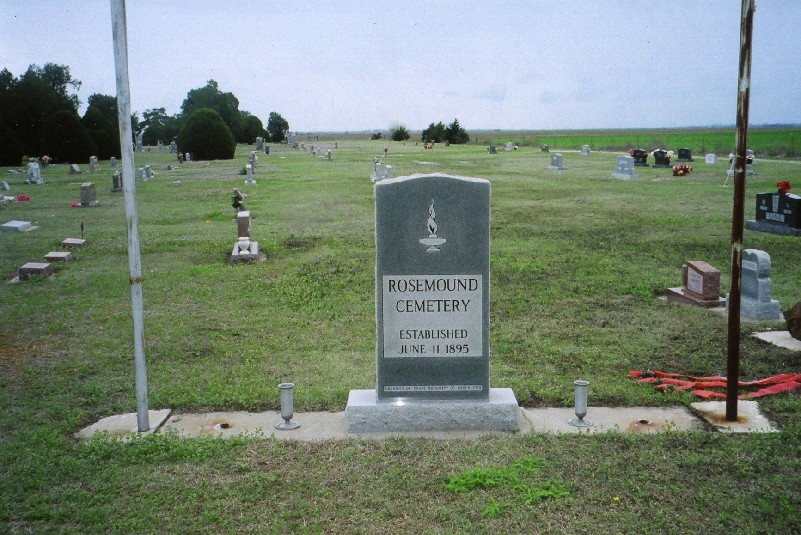"I served three years in the union Army during the rebellion with five brothers of mine in the 3rd Illinois Cavalry, Company E & D. My first battle I was engaged at Vicksburg. General Sherman Commanding that was in 1862.
We fell back from there to Arkansas Post which we took and then returned to Vicksburg on our away {sic} around to Vicksburg we captured Jackson Miss. My Company was the first to enter the City; from there we returned to Vicksburg. My Company was the first to open communications with the gun boats where we stayed until Vicksburg surrendered.
After that we returned to Jackson where we had to retake it. From there we went to Saline bottom where we engaged the enemy and had to retreat back to Little Rock. From here we went to Mempis, Tenn. to join our Regiment. It was here that General Forrest surprised us at night & captured only 18 men out of my Company. I and my five brothers escaping ....during our term of service none of us were wounded or were in the Hospital or never had a furlough during the war nor any of us draw a pension.
From Memphis we went to Nashville where we were engaged in Conflict with General Hood all winter. Some time after we were sent to St Louis where I was honorably discharged my three years service having expired in defense of my Country."(--Research from the collection of James Elmore.)
After the war, Oliver decided to try his luck at mining. According to family, he went Colorado and after a time sent his niece, Libbie Miller, a pair of gold earrings that he said were made from gold from his own gold mine. Later he went to Arizona and in 1878 he discovered several rich veins of silver in mines near Tombstone. Then is a horrendous reversal of fortune, he killed a man named Martin Sweeney in a fight, was tried and convicted by a jury and sentenced to death. In the following years his death sentence was commuted to life (1880) and finally- after several members of the jury that had convicted him wrote to the Governor of the Territory on his behalf--Oliver was released from prison in 1883 on condition that he leave Arizona never to return. This he did.
Oliver was now 40 years old and still single. He had lost his fortune or most of it. In the summer of 1888 he was living in Ness City, Kansas and he visited his sister Rosanna Miller and her family in Delphos, KS. His grand niece Estella, then about ten, remembers his visit: "He was a handsome fellow, looked many years younger than he really was. He was a medium-sized man, with dark curly hair, smiling blue eyes, good features and a ruddy complexion. His excellent taste in style and dress was out of place in the farming district. His interst seemed intense as if filled with energy and force trying to learn as much as possible about all of the relatives." After two days in Delphos, he borded the train to take him back to Ness City. The family never heard from him again and thought that he had been murdered over mining interests.
In reality, in 1889 Oliver married and settled down starting a family in Ness City, Kansas. In September 1993 Oliver took part in the Cherokee Outlet Oklahoma Territory Land Run and laid claim to 160 acres near the present town of Medford, OK. He and his wife Alfretta, settled down to farming and had a total of nine children.
Oliver died at home on September 14, 1918, by all accounts a redeemed man, who took the secrets of this past life to his grave.
(From research by J. Elmore and the memories of Estella Miller Marshall, Oliver's niece)
"I served three years in the union Army during the rebellion with five brothers of mine in the 3rd Illinois Cavalry, Company E & D. My first battle I was engaged at Vicksburg. General Sherman Commanding that was in 1862.
We fell back from there to Arkansas Post which we took and then returned to Vicksburg on our away {sic} around to Vicksburg we captured Jackson Miss. My Company was the first to enter the City; from there we returned to Vicksburg. My Company was the first to open communications with the gun boats where we stayed until Vicksburg surrendered.
After that we returned to Jackson where we had to retake it. From there we went to Saline bottom where we engaged the enemy and had to retreat back to Little Rock. From here we went to Mempis, Tenn. to join our Regiment. It was here that General Forrest surprised us at night & captured only 18 men out of my Company. I and my five brothers escaping ....during our term of service none of us were wounded or were in the Hospital or never had a furlough during the war nor any of us draw a pension.
From Memphis we went to Nashville where we were engaged in Conflict with General Hood all winter. Some time after we were sent to St Louis where I was honorably discharged my three years service having expired in defense of my Country."(--Research from the collection of James Elmore.)
After the war, Oliver decided to try his luck at mining. According to family, he went Colorado and after a time sent his niece, Libbie Miller, a pair of gold earrings that he said were made from gold from his own gold mine. Later he went to Arizona and in 1878 he discovered several rich veins of silver in mines near Tombstone. Then is a horrendous reversal of fortune, he killed a man named Martin Sweeney in a fight, was tried and convicted by a jury and sentenced to death. In the following years his death sentence was commuted to life (1880) and finally- after several members of the jury that had convicted him wrote to the Governor of the Territory on his behalf--Oliver was released from prison in 1883 on condition that he leave Arizona never to return. This he did.
Oliver was now 40 years old and still single. He had lost his fortune or most of it. In the summer of 1888 he was living in Ness City, Kansas and he visited his sister Rosanna Miller and her family in Delphos, KS. His grand niece Estella, then about ten, remembers his visit: "He was a handsome fellow, looked many years younger than he really was. He was a medium-sized man, with dark curly hair, smiling blue eyes, good features and a ruddy complexion. His excellent taste in style and dress was out of place in the farming district. His interst seemed intense as if filled with energy and force trying to learn as much as possible about all of the relatives." After two days in Delphos, he borded the train to take him back to Ness City. The family never heard from him again and thought that he had been murdered over mining interests.
In reality, in 1889 Oliver married and settled down starting a family in Ness City, Kansas. In September 1993 Oliver took part in the Cherokee Outlet Oklahoma Territory Land Run and laid claim to 160 acres near the present town of Medford, OK. He and his wife Alfretta, settled down to farming and had a total of nine children.
Oliver died at home on September 14, 1918, by all accounts a redeemed man, who took the secrets of this past life to his grave.
(From research by J. Elmore and the memories of Estella Miller Marshall, Oliver's niece)
